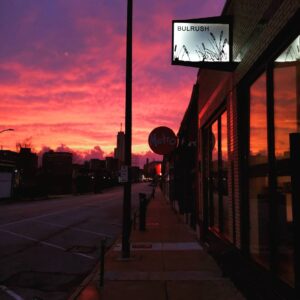In keeping with my habit of wondering about people I never see or talk to (and may not know at all), I decided to see how some of them are doing in the crisis.

Bulrush, March 2020. Photo courtesy Rob Connoley.
In June of last year I met Rob Connoley, owner of Bulrush STL, a new restaurant in the Grand Center Arts District in St. Louis. Rob is a James Beard semi-finalist chef who creates contemporary dishes based on historic Ozark foodways, and he and his staff forage and develop close relationships with regional growers.
Rob is an artist: uncompromising, ambitious, obsessed with process, yet sometimes filled with self-doubt. Bulrush received Best in Class for New Restaurants of 2019, from St Louis Magazine.
The restaurant had been open only 11 months when the pandemic hit, so Rob and his staff missed their anniversary. He tells me he is very science-minded and had been watching Covid-19 statistics, so he was able to prepare his employees for what he knew would be a big event. People in the city were rushing out to have one last party or meal, he says, but Bulrush closed to diners, even without a city or state mandate. They then did two or three weeks of carryout service, but in concern for customers and staff sent the rest of their perishables to Operation Food Search, to feed the hungry, and temporarily closed on March 28.
“I run a fiscally-conservative shop,” Rob says, “and we had six weeks to two months of funds to get by with no revenue, but I had totally forgotten the government still wants their taxes. First-quarter taxes were due in April, and that took a big chunk out of the reserve.”
Rob was among the first to sign up for the Paycheck Protection Program (PPP) from the Small Business Administration, which allows him to pay his staff two months of nearly-full wages, plus the Bulrush rent. The restaurant has gotten a deep-cleaning, and his staff is by turns foraging, pickling, and making other durable food and flavorings, such as different misos.
Their existing research program for historic recipes and ingredients continues, as does their work with seed banks. (Rob laughs when he says he knows a crazy number of paleobotanists and archivists.) Farmers are growing 23 crops for Bulrush, and Rob spends time assuring them he is still all-in.
He also has a personal garden at home, where he is trying things he has never grown before: German Chamomile, Musselburgh Leeks (from the Monticello historic seed bank), and something called Vine Peach or Mango Melon, which an old-timer brought to him and said could be used for pies.
“Anyone in the industry by nature likes to keep busy,” Rob tells me. “Mostly I’ve focused on chocolates since we closed. In the past dozen years I made them, and they were always good, people enjoyed them, but I saw the flaws because I couldn’t focus my time on them. Now I can spend three, four, five days just knocking out chocolates. It’s been fun.” A local roaster, Comet Coffee, asked him to collaborate, so he has been pairing chocolates with flavors of fruits or spices with profiles of their coffees. The chocolates have sold out in their shops, and on Mother’s Day were donated to local hospitals.
In addition, “I actually sleep now,” Rob says, “which I haven’t done in a long time. I can’t remember less than 14 hours of work per day in the last dozen years. I eat eggs and toast, and bought an espresso machine, even though I don’t like coffee. I got a rowing machine, since I’m always hunched over, chopping and kneading, and there’s a need to strengthen my upper back. I watch my old dog get older.” (Rob’s husband is working for now in another city to keep the income flowing.)
And Rob worries, including over feedback he got before the pandemic. One person in particular, whose opinion Rob respects, tried to convince him to be more homogenous, to serve a greater variety of more conventional plates. But Rob explains to me that he worked up 100 new dishes in less than a year. He simply is not after “sameness, even at high quality,” instead of innovation.
“It’s not my style,” he says, though he acknowledges that hearing someone say that “was really difficult at that time. It still is. They weren’t saying it to be mean-spirited. But those are not my customers.”
His goal, he says, is to want for someone to remember a meal they had at Bulrush 10 years from now, created by a sequence of events from suppliers, farmers, chef, staff, and the experience in the restaurant’s space. He says he compromises his business choices because he wants those relationships. His customers come back for the stories created by history, research, and connections to the scientific community.
He says he has heard some of his peers say they may have to close their restaurants for good after the crisis and re-imagine new ones. Rob knows there will be lasting impacts on society and his industry. But hearing them hedge their bets and say they might need to start over feels alien to him.
“I took care of my family-staff, and we hope to get through to the other side by tightening our belts. But we’re not going to be fast, not going to serve some cheap dinner. We’re a premium rent-payment, based on fine dining, and can’t just sell tacos and expect to pay the bills.
“Really it comes down to perseverance. We’re just warming up with Bulrush. It has never been about just putting food on a plate. It’s about learning the history and telling stories of soil, culture, and family-farm economies. It’s about the staff who gather or forage the food, how it’s cooked in the restaurant, and presented to customers—so they can experience all that.”
